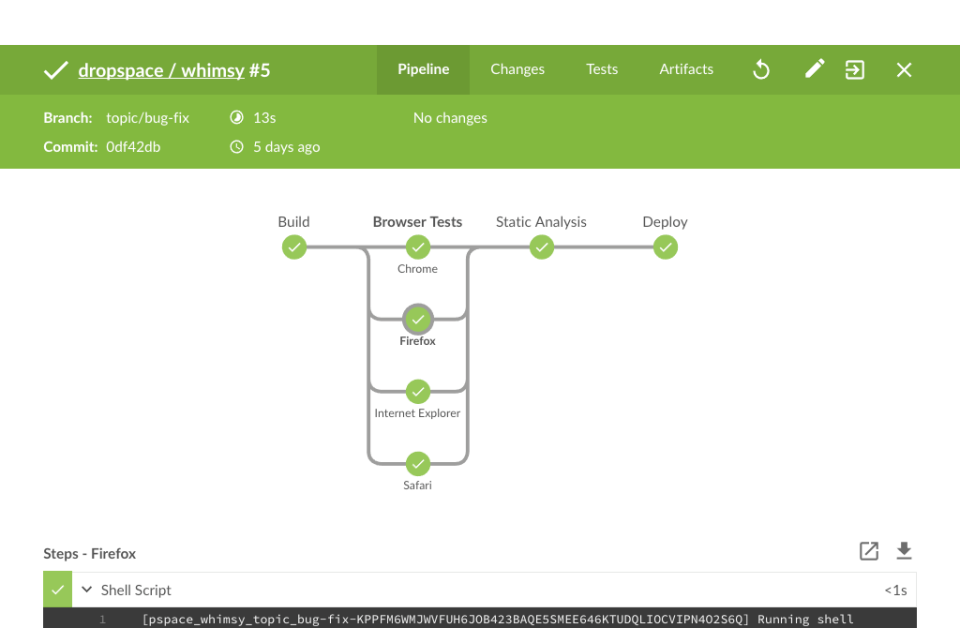Jenkins
About Jenkins
Jenkins Pricing
Jenkins is available to users for free.
Free trial:
Not Available
Free version:
Available

Most Helpful Reviews for Jenkins
1 - 5 of 552 Reviews
George
10,001+ employees
Used less than 12 months
OVERALL RATING:
3
Reviewed April 2022
Release management system that gets the job done
Monish
Verified reviewer
Computer Software, 1,001-5,000 employees
Used daily for more than 2 years
OVERALL RATING:
5
EASE OF USE
5
VALUE FOR MONEY
4
CUSTOMER SUPPORT
3
FUNCTIONALITY
4
Reviewed April 2020
Product Build Version Management and Ad-hoc jobs Scheduling
Jenkins has been a great tool for maintaining build version and scheduling timely jobs
PROSJenkins plays a important role in product development and deployment lifecycle, where a developer can build his code and give the build version to QA for testing, ones the build is tested it can be signed off and deployed to prod, Not one but many Different Applications can be created and can be built and maintain the build versions of each applications, Ad-Hoc scripts can be managed and can be triggered when required or schedule it in a timely manor, the jobs can be parameterised or non-parameterised, and can even set default parameter value, The scheduling of jobs are done using cron string, Usually we use linux shell scripts for job build configurations, it can also be done by many different ways. We can configure different executor machines for different jobs to distribute the load, Supports parallel processing of different jobs at the same time, User permissions are manageable (read, write, build etc.. ), It has lot's of native and third party plugins, for achieving different use-cases, and lot of community support, The features are well-documented inline, it has a great version control of the job configuration
CONSScheduling becomes little complicated if the job has to run in un uniform interval of time, for which we had to set up two jobs with the same build configuration and different cron scheduler, sometimes the application dropdown values disappears when used with different executors , Not a fully cloud-based solution, infrastructure should be managed internally, maintains limited build history,
Tamseel
Verified reviewer
Computer Software, 11-50 employees
Used weekly for less than 2 years
OVERALL RATING:
4
EASE OF USE
3
CUSTOMER SUPPORT
4
FUNCTIONALITY
5
Reviewed October 2019
Jenkins is great open source continuous integration tool for large scale applications.
I have used Jenkins for few projects with team members, we used it because we needed more flexibility at configuration. It is the only choice when you need more control over integration and testing. It is hard to configure and install but that is the trade-off for control over customization and configuration. Jenkins is free of cost itself although you need to server to host it. We use Jenkins only for projects which require more configuration and security.
PROSCurrently Jenkins is the only CI tool which has the largest set of plugins, it gives you more control over how it should work, like you can customize pipeline of continuous integration and delivery. There are plugins allow you to run Jenkins in kubernetes and docker but we never ran it on containers. Huge number of plugins available for Jenkins which allow you to integrate with other tools and customize it to your needs, plugins are available at Jenkins update center. Great thing about Jenkins is it work on windows, Linux and mac OS. Cost of using Jenkins is free because its open source although you need server to host it, you must maintain and update and that's your responsibility.
CONSJenkins is not easy to use you need to configure it and host it before using unlike tools like travis CI which is ready to be used. Learning curve is steep because it has lot of features and customization which is little bit hard at start. Hosting server is needed to host Jenkins, which means you also need to pay for hosting. Maintenance and updation is user responsibility.
Reasons for switching to Jenkins
You don't get control over configuration like Jenkins. There were project which needed security and could not be host on third party tools where as Jenkins can host on your own server. Larger set of plugin is also the reason of switching.
Marek
Verified reviewer
Biotechnology, 201-500 employees
Used weekly for more than 2 years
OVERALL RATING:
3
EASE OF USE
3
FUNCTIONALITY
4
Reviewed May 2023
Powerful tool, with not so nice user experience
I never encountered that something could not be done on Jenkins. Jenkins is very versatile tool for CICD purposes.
CONSThe UI is a bit complex and the learning curve is steep. The UI of the website has not changed much in last years making it look a bit out-dated.We usually highly under-estimated time spent on any workflow that needed to be done in Jenkins.
Reasons for switching to Jenkins
(more specifically GitHub Actions) We decided that it suits better our use cases.
Ajay kumar
Information Technology and Services, 2-10 employees
Used daily for less than 2 years
OVERALL RATING:
5
EASE OF USE
5
VALUE FOR MONEY
5
CUSTOMER SUPPORT
5
FUNCTIONALITY
5
Reviewed January 2024
Automation testing tool for beginners to experts
Basically I am Full Stack developer, But I am doing Testing, UI/UX, SEO and more because I am working in startup company. Jenkins is my first test tool and this last testing tool also because it's very easy to learn no need any experience to learn Jenkins. Second thing Jenkins didn't take more space in your laptop because it's run completely run in website just minimum setups only have in your system and more easy to integrate. My side opinion Jenkins don't have the drawbacks it's really very well of all testers.
PROSThe main reason to like Jenkins' is online interface, which offers integrated assistance and real-time error checking, makes it simple to set up and configure. The second thing it's very easy handle and they provide lots of plugins for pipeline project automation testing. Thirdly, there is The Continuous Delivery feature makes software delivery more dependable, automated, and efficient, which promotes better cooperation, quicker software releases, and higher-quality software overall. These are the reasons why I continue to use Jenkins
CONSMy side opinion Jenkins don't have the drawbacks it's really very well of all testers.


